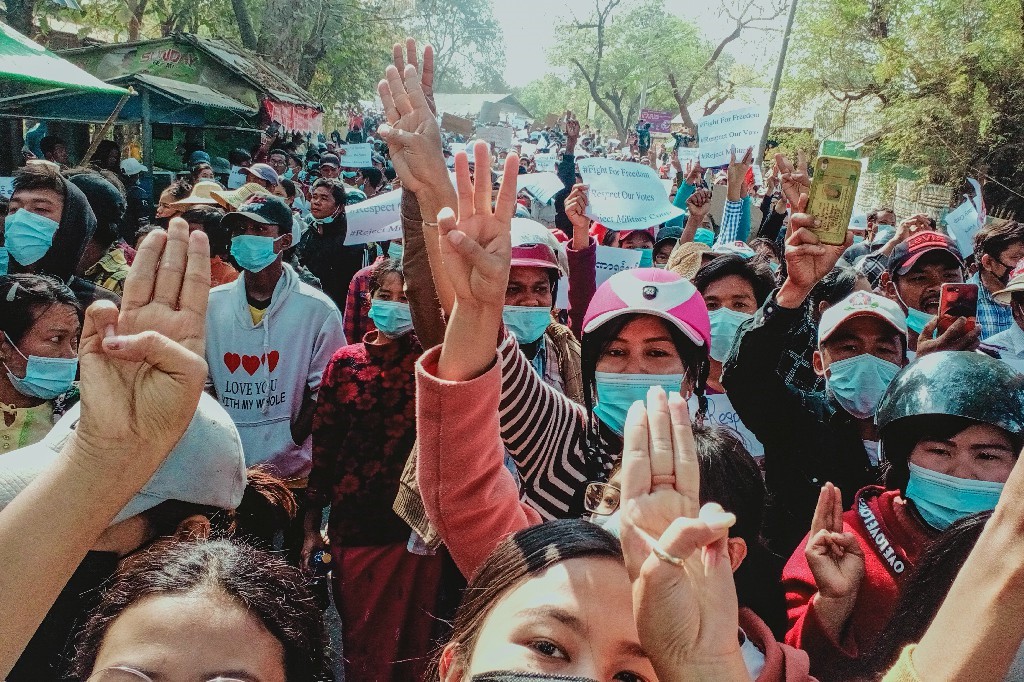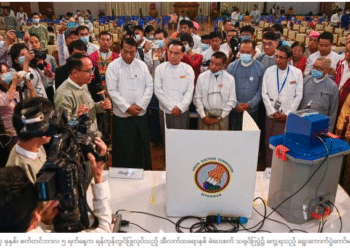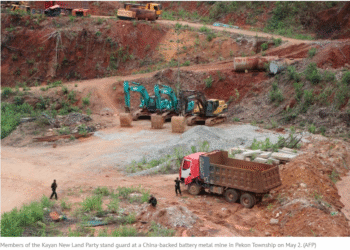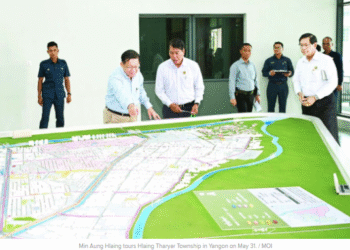On February 8, residents of Pauk in Magway Region began gathering each day at an abandoned airstrip just outside town. After waiting for residents of nearby villages to arrive, they would march through the streets of Pauk, protesting against the military coup and calling for the restoration of democracy.
One prominent attendee of these rallies was U Zaw Moe, 50, a wealthy resident known for his philanthropy. Together with his friends in Pauk, he runs a charitable association, Thukhi Saydanar (Pleasure of Goodwill).
Zaw Moe not only joined his neighbours in protesting the coup, but also supplied demonstrators with food, drinks and facemasks. His efforts soon attracted the attention of the police. Within weeks, the authorities declared that Zaw Moe – along with dozens of other protestors, activists and community leaders in Pauk – had violated section 505-A of the amended Penal Code, a charge that the junta has levelled at thousands of regime opponents since the coup, and carries a prison term of up to three years .
Although others targeted for their activism fled, Zaw Moe continued to live at his home with his wife, Daw Khin Moe Kyi, and their two sons. The authorities came for him on February 27, Khin Moe Kyi, 51, told Frontier. Later the same day, the police cracked down on protesters, firing into the crowd with rubber bullets and lobbing teargas grenades for the first time.
For weeks, Khin Moe Kyi had been warning her husband that getting involved in the protests was risky, but Zaw Moe replied that he had to protect his family from a future under the military junta. “He thought he was just an ordinary citizen who does volunteer work, and he’d done nothing wrong. So he didn’t run,” she said.
Pauk residents were quick to respond to Zaw Moe’s arrest.
“We surrounded the Pauk township police station and demanded the release of Ko Zaw Moe. But they confronted us and started shooting at us,” said Aye Aye, 22, a resident of Pauk who asked not to use her real name.
Six protesters were arrested, including one 16-year-old boy, and detained in Pakokku prison.
On May 27, Zaw Moe and five of the six protesters were sentenced to three years in prison (the 16-year-old was released).
Because the hearings were held inside the prison, Khin Moe Kyi was unable to attend, and has not seen Zaw Moe since his arrest.
“I’m depressed because my husband is away from me and our family during this difficult time,” said Khin Moe Kyi.
Renewed leadership
The arrest of protest leaders and the crackdowns on demonstrations in late February had an almost immediate effect in Pauk. With security forces strictly monitoring Pauk’s residents, street protests in the town sputtered out barely a week later. Protests in nearby villages continued, with hundreds of people attending rallies, but those too stopped by the end of March.
But the disappearance of protests has not meant the end of the resistance in Pauk. Deprived of the ability to demonstrate peacefully, some turned to armed conflict. The first battle between civilian and regime forces broke out on May 31, and Pauk has since emerged as a stronghold of resistance to the regime.
Control of the region is particularly important for the Tatmadaw, because it is home to a Directorate of Defence Industries factory that produces military supplies like firearms and grenades for the security forces.
At the camp of the Southern Pauk Guerrilla Force (SPGF) in Pauk Township, several dozen members, mostly young people, were playing revolutionary songs and drinking beer. Their Tumi guns – homemade, single-shot hunting rifles that are common in the area – were set aside for the day. They were celebrating and resting after days of fighting Tatmadaw troops.
Fighting had broken out at 6:55am in the forest near Thakkal Kyin village tract, at the southwestern edge of the township, on July 5. In repeated skirmishes over the next two days, the SPGF fighters claimed to have killed six out of an estimated 80 soldiers, and suffered only one casualty on their side.
Inside a wooden house about five minutes’ walk from the festivities, U Pyan Hlwar, 46, was going over the fighting with other SPGF leaders. The old AK series assault rifle that lay beside him hinted that, unlike most SPGF members, he is no stranger to armed conflict.
Pyan Hlwar was formerly a member of the All Burma Students’ Democratic Front, an armed resistance group formed by activists after the 1988 national uprising. He arrived in Pauk in May, as a result of his friendship with Daw Lwin Lwin Myint, the leader of the Pauk People’s Defence Force (PPDF). On May 28, he set up the SPGF. Due to security concerns, Pyan Hlwar did not reveal what he had been doing in the intervening years.
As we spoke on the evening of July 7, five Union Solidarity Development Party members from a nearby village arrived bearing steamed rice and chicken curry.
Many USDP members and those thought to be regime informers have been killed in recent months, particularly since the emergence of the pro-military Pyusawhti network. But the five explained that although they support the USDP, they are not informers and have pledged never to inform on the armed resistance.
Pyan Hlwar explained that the SPGF was not “fighting the colours” – a reference to political parties, with red representing the National League for Democracy and green the USDP. “We are just fighting the system,” he said.
But Pyan Hlwar does not hesitate to eliminate opponents of the resistance either. He said that the SPGF had killed two informers in May, an admission corroborated by residents of Kinma, Kaing Lal and Kin Sote villages.
U Nyo Chaw, a USDP organiser in Kin Sote village, was killed on May 25, and U Aye Lwin, a clerk at the General Administration Department office in the same village, was killed five days later. Nyo Chaw was killed in the act of speaking on the phone to security forces, while Aye Lwin was arrested by the SPGF before being executed. Both were shot in the head.
“Both of them made trouble for villagers in the area. They informed on ordinary people who participated in NLD campaign events ahead of the election. They also informed on people who joined the Civil Disobedience Movement. They have been very active since February. That’s why we executed them,” Pyan Hlwar said.
Regime forces responded to the killing of the two alleged informers by launching operations in the area around Kin Sote village on May 31. In the ensuing battle, the SPGF said they killed 33 soldiers and police, and suffered no casualties.
Over dinner, the SPGF leader revealed little to Frontier about himself, apart from that he is from Bago and has a wife and daughter. There was only one thing he really wanted to discuss: strategy.
He said PDFs across Magway Region were building up their strength. It would take some time for them to be properly prepared for a fight with the Tatmadaw, but he insisted that a broader conflict was coming.
“The revolutionary flame has to keep burning. I want to urge people to start preparing. They need to start collecting food and store it in at least three different places because bigger battles are still to come,” said Pyan Hlwar.
For now, the SPGF operates independently and is not affiliated with the National Unity Government or its People’s Defence Force. Pyan Hlwar said he disagrees with the NUG’s request that PDFs do not start fighting until “D-Day” – a vaguely defined term that different ministers within the NUG use to refer to resistance in general or a specific military operation, and sometimes both.
“I can’t accept this request, because we still need to protect this area. However, when the PDF actually comes, I will deliver my forces to them,” said Pyan Hlwar, “but at this moment, the people here already need our protection.”
In the meantime, the SPGF says it is inflicting heavy casualties.
On July 15, Tatmadaw soldiers shot a mortar into Kin Sote village and killed an elderly woman. By the time they actually entered the village, residents had already fled. Soldiers seized goods from their houses and killed cattle and poultry for food, residents told Frontier.
Three days later, on the morning of July 18, the soldiers left and marched toward Kyi Ngo Taung, a nearby mountain that has been the scene of heavy fighting in recent months. En route, about 8km (5 miles) from the village, the SPGF detonated three explosives, killing at least 15 soldiers. The group said that when reinforcements came to retrieve the dead bodies, more of its mines exploded, killing 17 more soldiers.
Despite the losses, the Tatmadaw entered Zee Taw village and Kyi Ngo Taung again on July 19. Twelve more soldiers were killed in clashes with the SPGF, and the military retreated the following day. In just a few days, the guerrilla group says that 44 Tatmadaw were killed with only one casualty on the SPGF side, although Frontier has been unable to independently verify these claims.

‘We can only end this with an armed revolution’
As soon as the military seized power on February 1, Lwin Lwin Myint became involved in the protests in Pauk Township. Activism runs in her family: the 44-year-old is the younger sister of U Nyi Nyi Lwin. More widely known by his monastic name U Gambira, he was one of the monks who led the 2007 protests and is now living in Australia. Their father was also a protest leader in Pauk township during the 1988 uprising.
Lwin Lwin Myint decided to form the Pauk PDF in March after security forces cracked down in the town of Pauk and also left one man dead and another severely injured in nearby Yay Pyar village tract.
Because of her background as a volunteer teacher, Lwin Lwin Myint is both respected and well-connected in her community. After protests became too dangerous, she started a local militia, later branded the Pauk PDF, together with other like-minded people. She also began helping young people travel to areas under the control of ethnic armed groups for military training. When Pyan Hlwar came to Magway Region in May, Lwin Lwin Myint helped him organise the guerrilla force that later became the SPGF.
“The people understand that we can only end this with an armed revolution. And they understand that they can only protect themselves when they have their own defence force. Therefore, many youth want to join the PPDF,” she explained.
Lately, the group has been battling not only the security forces but also Pyusawhti – armed civilian groups aligned with the military – who are believed to be very active in the region. According to the PPDF, in Dee Dote Kwen village tract, which has a population of around 6,000 people, there is a Pyusawhti group with about 60 members.
On August 13, an NUG supporter in Chat Kan village in southern Pauk township was killed by Pyusawhti members, according to sources in Kaing Lal, Kin Ma and the PPDF. Other villagers, who are thought to be affiliated with Pyusawhti, told police that local PDFs were responsible for his death.
PPDF leader Lwin Lwin Myint rejects these claims. She believes it was a targeted killing, and that Pyusawhti members not only killed the man but also looted his house. She told Frontier by phone that the same group destroyed a grocery and stole villagers’ property in Dain Kwen village, next to Chat Kan – something she insisted PDF members would never do.
Community members told Frontier that several months ago Pyusawhti groups in the area had announced that they would work with authorities to arrest and kill CDM participants, as well as dozens of community leaders, including Lwin Lwin Myint, two Buddhist monks and some NLD party members. On June 4, they distributed letters urging residents to inform them of the whereabouts of about two dozen local residents who were wanted by the military.
Lwin Lwin Myint was well ahead of them, though – she left Pauk in late March for a “safe zone”, she said, and has since been running the PDF from afar. She would not reveal whether she was in an EAO-controlled area, still in Magway, or abroad.
The NUG’s plans
U Ye Tun Win, the 55-year-old Pyithu Hluttaw MP-elect for Pauk and a member of the Committee Representing Pyidaungsu Hluttaw, said that the NUG’s plan is to divide the PDF into five military commands. Under this structure, Pauk Township would be under Western Command.
Ye Tun Win told Frontier that he sends daily reports to the NUG’s defence minister, U Yee Mon, and that youth who attend PDF training courses will join the West Command in the future.
“We, the people, will definitely win this revolution … Each family needs to do what they can. We understand this is a tough time, but it is only for a short time,” said Ye Tun Win.
In Pauk, there seemed to be no shortage of eager recruits. Young people in the town, some of whom had already joined the PPDF, told Frontier the military coup had left them shocked, angry and feeling hopeless.
“The 2020 election was my first voting experience. When I heard about the coup, I felt empty inside. I had plans for my future but I felt like the coup shattered them into pieces,” said PPDF member Ko Pyae, 20, whose name has been changed for his safety.
Before the coup, Ko Pyae was a student at Pakokku University, and he said he had planned to go and work in Japan.
Ko Pyae joined the PPDF even though he has a sister who is a police officer stationed at the Pauk police station. She knows her brother is involved in PPDF and has not tried to dissuade him, only warning him to carry out his tasks surreptitiously.
“We are on different paths, my sister and I. She didn’t join the CDM, even though I urged her to. She doesn’t interfere [with my decision] … but she doesn’t give me secret information about the security forces,” said Ko Pyae, who helps to gather intelligence for the group.
His biggest frustration is that though the PPDF has carried out some missions, they are still waiting to engage in large-scale fighting as they have no arms and no support from the NUG as yet.
Lwin Lwin Myint said she was frustrated that people in other townships in Magway Region had not done more to form their own PDFs. In contrast to the civilian militias in Pauk, most of those elsewhere in Magway have been slow to organise and carry out operations, she said.
“Why have the people in Seikphyu, Myaing or Pakkoku not dared to organise and fight against the enemy?” she asked. “We can’t revolt against the enemy just by sitting in the house. Only after we uproot the enemy, will we all be able to live our lives peacefully.”
Source: FRONTIER






